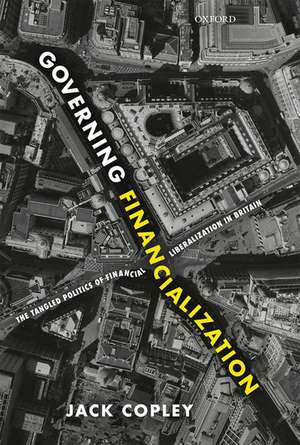Governing Financialization: The Tangled Politics of Financial Liberalization in Britain
Autor Jack Copleyen Limba Engleză Hardback – 7 dec 2021
Preț: 497.60 lei
Preț vechi: 611.86 lei
-19% Nou
Puncte Express: 746
Preț estimativ în valută:
95.23€ • 99.05$ • 78.62£
95.23€ • 99.05$ • 78.62£
Carte disponibilă
Livrare economică 13-19 martie
Preluare comenzi: 021 569.72.76
Specificații
ISBN-13: 9780192897015
ISBN-10: 0192897012
Pagini: 208
Dimensiuni: 161 x 240 x 16 mm
Greutate: 0.44 kg
Ediția:1
Editura: OUP OXFORD
Colecția OUP Oxford
Locul publicării:Oxford, United Kingdom
ISBN-10: 0192897012
Pagini: 208
Dimensiuni: 161 x 240 x 16 mm
Greutate: 0.44 kg
Ediția:1
Editura: OUP OXFORD
Colecția OUP Oxford
Locul publicării:Oxford, United Kingdom
Recenzii
Copley provides an account of state actors as powerful but still themselves compelled by mute compulsion, specifically in the form of crisis, though their responses are significantly underdetermined. In effect, governments scramble to ride the tiger rather than proceeding via any grand master plans and in doing so they generate policy outcomes that then influence the actions of future governments...The book demonstrates both the power of Marxist theory to inform empirical inquiry and of such inquiry to generate concepts which apply to other objects of analysis in other times and places.
This book is essential reading for scholars interested in financialisation and the role of the state in propelling it. But it will also be of interest to those seeking to understand state action under capitalism more generally.
Copley provides an analytically sharp and empirically rich account of the politics of financial liberalization in Britain. Looking at key moments in Britain's post-war financial history, and drawing on an extensive body of archival research, his powerful narrative demonstrates the contingent origins of financialization dynamics as different British governments sought to navigate a rapidly shifting economic terrain caused by the falling global profitability of capital.
The penetration of finance into every aspect of modern life is a central feature of our times. In this arresting new analysis and based on extensive archival research Jack Copley shows how financialization in Britain developed in the 1970s and 1980s not because of a long-term plan to impose it, but as a series of pragmatic responses to particular political problems which reflected perennial governing dilemmas of managing a capitalist economy. This book makes a major contribution to our understanding of policy change and policy outcomes in contemporary political economies.
Jack Copley's outstanding book argues against the grain of contemporary analyses of financialization and public policy. Its central theme is the limitations and constraints on state action which arise from the global flow of money. It makes its case by carrying forward the most advanced thinking on the critique of political economy. This is an exquisitely argued book.
If you think you already know all you need to about financialization, think again. Through meticulously detailed archival research Jack Copley pieces together the decisions through which financializing dynamics were first inserted into the British economy in the 1970s and 1980s. He shows that there was no grand plan, no careful step-by-step introduction of a pre-determined long-term reform trajectory, only governments attempting to navigate their way in a hit-and-miss manner through a seemingly intractable crisis of profitability. The exquisite reconstruction of events as they unfolded in real time makes for a thrilling read, as well as for a very important book.
This book is essential reading for scholars interested in financialisation and the role of the state in propelling it. But it will also be of interest to those seeking to understand state action under capitalism more generally.
Copley provides an analytically sharp and empirically rich account of the politics of financial liberalization in Britain. Looking at key moments in Britain's post-war financial history, and drawing on an extensive body of archival research, his powerful narrative demonstrates the contingent origins of financialization dynamics as different British governments sought to navigate a rapidly shifting economic terrain caused by the falling global profitability of capital.
The penetration of finance into every aspect of modern life is a central feature of our times. In this arresting new analysis and based on extensive archival research Jack Copley shows how financialization in Britain developed in the 1970s and 1980s not because of a long-term plan to impose it, but as a series of pragmatic responses to particular political problems which reflected perennial governing dilemmas of managing a capitalist economy. This book makes a major contribution to our understanding of policy change and policy outcomes in contemporary political economies.
Jack Copley's outstanding book argues against the grain of contemporary analyses of financialization and public policy. Its central theme is the limitations and constraints on state action which arise from the global flow of money. It makes its case by carrying forward the most advanced thinking on the critique of political economy. This is an exquisitely argued book.
If you think you already know all you need to about financialization, think again. Through meticulously detailed archival research Jack Copley pieces together the decisions through which financializing dynamics were first inserted into the British economy in the 1970s and 1980s. He shows that there was no grand plan, no careful step-by-step introduction of a pre-determined long-term reform trajectory, only governments attempting to navigate their way in a hit-and-miss manner through a seemingly intractable crisis of profitability. The exquisite reconstruction of events as they unfolded in real time makes for a thrilling read, as well as for a very important book.
Notă biografică
Jack Copley is Assistant Professor in International Political Economy at Durham University. He writes and teaches on the politics of governing global capitalism and has published his research in the journals New Political Economy, The British Journal of Politics and International Relations, Environment and Planning C, and Capital and Class.
